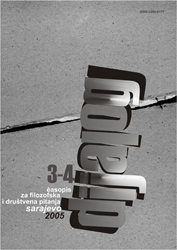JEDINSTVO U KOLEKTIVNOM TOTALITARNOM TIJELU
UNITY IN A COLLECTIVE TOTALITARIAN BODY
Author(s): Senadin MusabegovićSubject(s): Philosophy
Published by: Akademija Nauka i Umjetnosti Bosne i Hercegovine
Summary/Abstract: This paper deals with the role of the modern hero in the constitution of unity of a collective totalitarian body. The modern hero no longer has any need to associate himself with and achieve unity with the transcendental centre that was before history and the creation of the world itself, nor to sing its myths, so as to unite the collective through ritual. In the modern age, the purpose of generating heroes, in the immediate, is the unification of the collective: the hero transcends himself through his own heroic act so as to join the collective just as the collective joins with him. Collective unity is thus no longer manifested through religious principles; it manifests itself through action itself, through the gesture that forms the collective itself. By this means, and following its own logic, the collective body does not manifest its own principle of unification through an invisible, static structure, the structure that was before history itself was; unification is established collectively in time. But since the body achieves unity in its own action, which occurs after the experience of fragmentation, of dissolution, the experience of disunity, of separation, is required for the actual action of the body, which is to say that disunity is inherent in unity itself. The paper analyses the manifestation of this relationship in two of the most typical totalitarian regimes constituted after World War I – fascism and bolshevism – and finds that after the fall of both, democratic European countries have still not problematized the national myth, which is for many liberal intellectuals an opportunity for an open democratic society. This, the author concludes, is why in the war in Bosnia and Herzegovina, a multiethnic community not based on majority-minority relations or on territorial segregation, European countries were paralyzed and helpless. The trauma of the national myth, dictated back in World War I, is still present there as political logic. Ethnonationalism itself, however, increases our aggressive potential and determines the target of our aggressivity. Ethnonationalists see in every member of rival ethnonational groups, without exception, people not to be trusted, the source of all possible evil, and who want to harm them even when it appears that their intentions are otherwise. For optimists, the paper ends on a pessimistic note, with the conclusion Theodore Zeldin reaches in his book An Intimate History of Humanity: “Will people stop irritation, hating or fighting each other when the spirit of racial, political, religious toleration gradually spreads over the world? Only those with short memories can believe it. Toleration has always been like a summer season, followed by cold and storms.”
Journal: Dijalog - Časopis za filozofiju i društvenu teoriju
- Issue Year: 2005
- Issue No: 03+04
- Page Range: 42-59
- Page Count: 18
- Language: Bosnian

